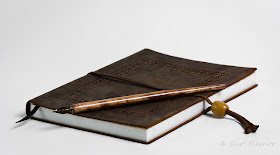Photo credit: CFleenor (Flickr)
One of the first things that I ask of my clients to do before I even meet with them is to keep a food and activity journal for at least 3 days. What I love about this is that not only will these records help me in my nutrition assessment, but they also serve as a powerful starting point for a nutrition intervention before I even meet with my client. It's a great conversation starter because it gives them some insight into their food intake, eating habits, and physical activity behaviors. During these 3 days, my clients almost always admit to changing their food or eating habits because they suddenly became more aware of them. All of this, and I haven't even met with them yet. There's definitely power in that!
How will it help you with weight and health management? First of all, you've got to know what you're eating in order to change it as well as the behaviors around it. I call a food journal the GPS for weight and health management. A food journal helps you see where you've been, where you're at, and where you need to go. By looking at where you've been, you get clues about the patterns of food intake and behaviors that were strengths as well as those that present opportunities for change. Maybe you've been eating consistently throughout the day, but you haven't been hitting the mark with your vegetable and fruit intake. You've now identified a great starting line toward your weight and health management goals. By looking at where you're at, you can assess your progress, reinforce positive behaviors, and identify areas of opportunity. When a client sees that she has been eating breakfast daily and she feels more energy throughout the day, then that behavior is strengthened since she sees the positive behavior and the benefit that results from it. On the other hand, a client may notice that every time she misses the afternoon snack, she tends to overeat once she gets home from work. Because of the awareness of this pattern, the client can then work on strategies to ensure that she includes the afternoon snack. Finally, a food journal provides direction on where you need to go. If the foods and behaviors that you're keeping track of in the food journal are leading to the results that you desire, then keep doing what you're doing. If not, then it's decision time. It may be time to re-evaluate your goals to decide whether or not they're still the same. If your goals are still the same, you may need to pinpoint some areas in which you're willing to step it up a notch. Maybe it's time to practice maintaining those behaviors before ratcheting things up. Maybe you need some additional professional guidance, such as a therapist, to gain support in other areas of your health or well-being.
So how do you get started? There are lots of tools for keeping track of food intake and physical activity. Some people prefer the good ol' pen and paper method. Others prefer online tools, such as MyPlate or MyFitnessPal. Others like phone apps, like Lose It! or MyFitnessPal Mobile. There are lots of options, so check them out and choose what's best for you. I have my clients use the pen and paper method to start since there is usually additional information that I like to assess, like hunger levels, activities, emotions, or thoughts, that aren't always included in digital programs. (But if you know of one, please let me know!) It's best to record everything that passes your lips: foods, beverages, and condiments. Amounts and times are also helpful. Sometimes clients get overwhelmed at the idea of keeping track of everything they eat, so I suggest that they just start writing down the foods they consume. This still provides helpful information. Gathering additional details, such as hunger levels, signs or symptoms, and activities, emotions, or thoughts while eating can also provide helpful insights. Including information about the type, time, intensity, and duration of physical activity is also very useful.
Whether you're just starting out or you've hit a bump in the road, a food journal could definitely be the key to discovering what you need to do in order to best achieve your goals. Go after a life of health because you deserve it!
Have you kept a food journal before? What method do you prefer? What's your favorite digital tool?

No comments:
Post a Comment